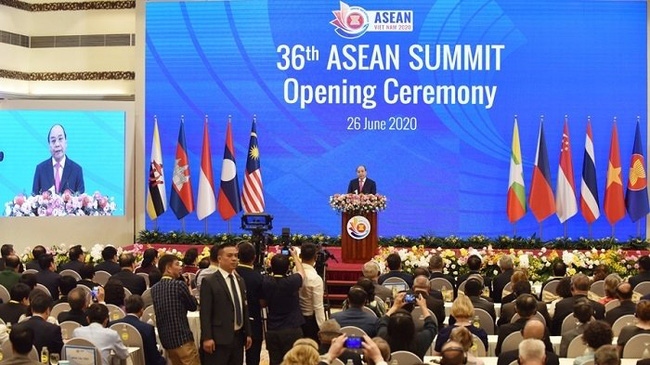ASEAN Post hails Vietnam’s leading role in regional bloc
VOV.VN - The ASEAN Post has recently run an article appreciating the role of Vietnam in its capacity as ASEAN Chair 2020 and the nation’s positive contributions to the regional bloc.

Vietnam, as the current Chair of the Association of Southeast Asian Nations (ASEAN) for 2020, has been actively involved with the association since 1995 when it joined the bloc with the aim of bringing all Southeast Asian countries together to promote regional peace, freedom, and prosperity.
The country has been making great strides in projecting itself as an effective leader, particularly with its proactive governance in handling the COVID-19 pandemic, climate change policy, and for its political stability. There has been recent speculation regarding Vietnam taking-up the role as new de facto leader of ASEAN, the article said.
Vietnam has achieved the United Nations’ (UN) climate action goal, while Indonesia, Thailand, Malaysia, and Singapore have fallen behind, as most European nations have. The UN's Sustainable Development Goal (SDG) 13 is climate action. Countries have to reach five targets, including measures for reducing carbon emissions and investment in climate resilience.
According to the Sustainable Development Report 2020, Vietnam is the only Southeast Asian country that has achieved climate action. The nation is powering ahead of the rest of Southeast Asia as it pushes for greater reliance on renewable energy.
The McKinsey Insights 2019 report titled, “Exploring an alternative pathway for Vietnam’s energy future”, states that Vietnam has tremendous natural endowments with four to five kilowatt-hours (kWh) per square metre for solar and 3,000 kilometres of coastline with consistent winds in the range of 5.5 to 7.3 metres per second (m/s) for advantaged solar and wind generation.
According to the article, even during these unusually rough times, the Vietnamese economy has been remarkably resilient. Vietnam is nonetheless in a good position to escape the COVID-19 economic trap for three reasons.
Notably, the government has introduced tax breaks, the delaying of tax payments, and land-use fees for businesses while the investment law in the country has been revised several times, mainly adopting a more profitable approach for investors by reducing administrative bureaucracy and facilitating foreign direct investment (FDI) to Vietnam.
As a result, FDI worth over US$12 billion was registered between January and April, 2020. Due to investment inflow, which is still on an unprecedented rise, Vietnam is potentially becoming the fastest-growing digital economy in Southeast Asia. Over the last four years, approximately US$1 billion in funding has poured into the nation's e-commerce sector.
In addition, Vietnam has also adopted a landmark trade deal with the European Union (EU) on 29 June, 2020. Beginning July 2020; the EU has lifted 85% of its tariffs on Vietnamese goods, gradually cutting the rest over the next seven years.
In return, Vietnam will lift 49%of its import duties on EU exports and phase out the rest over 10 years. In addition, Vietnam recorded a trade surplus of more than US$9.9 billion, the highest compared to the previous four years. As a result, Vietnam economy is expected to grow positively in 2020.
Vietnam’s economy during the third quarter has showed positive signs, registering a 2.6% growth driven by the agriculture, forestry, and fisheries sectors, which grew 2.93%. The industry and construction sector grew 2.95 % and services grew 2.75%. Overall the country’s growth in 2020 is projected to be in the range of 2.9%.
The article went to say that Vietnam is one of the more politically stable countries in Southeast Asia. The one-party state is ruled by the Communist Party of Vietnam (CPV), which provides strategic direction and decides on all major policy issues while internal conflicts are strictly controlled.
The success of Vietnam's COVID-19 strategy – which is centred on its experience with similar virus outbreaks in the past – has rightly attracted the attention of the international community. The ASEAN member state should be commended for its effective pandemic policies, which has resulted in low levels of transmission and fatalities, it said.
In its conclusion, the article said that as Southeast Asia’s rising star, Vietnam could assume an effective dual leadership strategy with traditional ASEAN de facto leader, Indonesia.
Together, both states can alter the security environment of ASEAN and lead the association in the right direction in terms of all its member states’ individual and collective goals. This dual-leadership could perhaps help ASEAN weather the approaching storms of a post-pandemic world, it noted.
